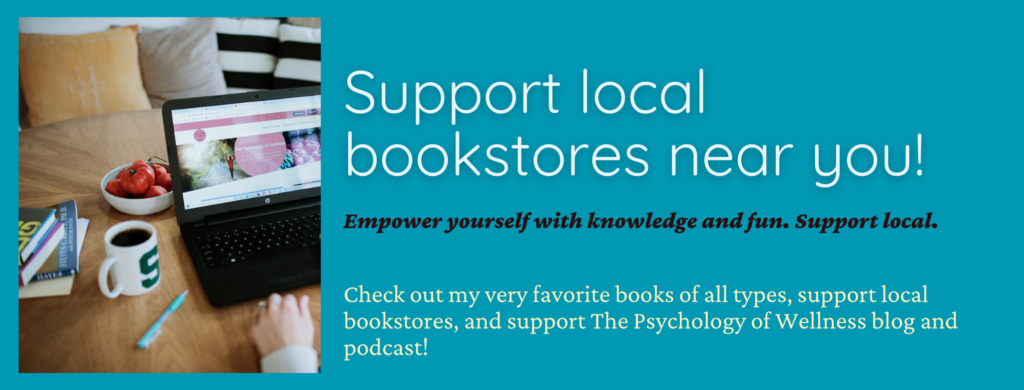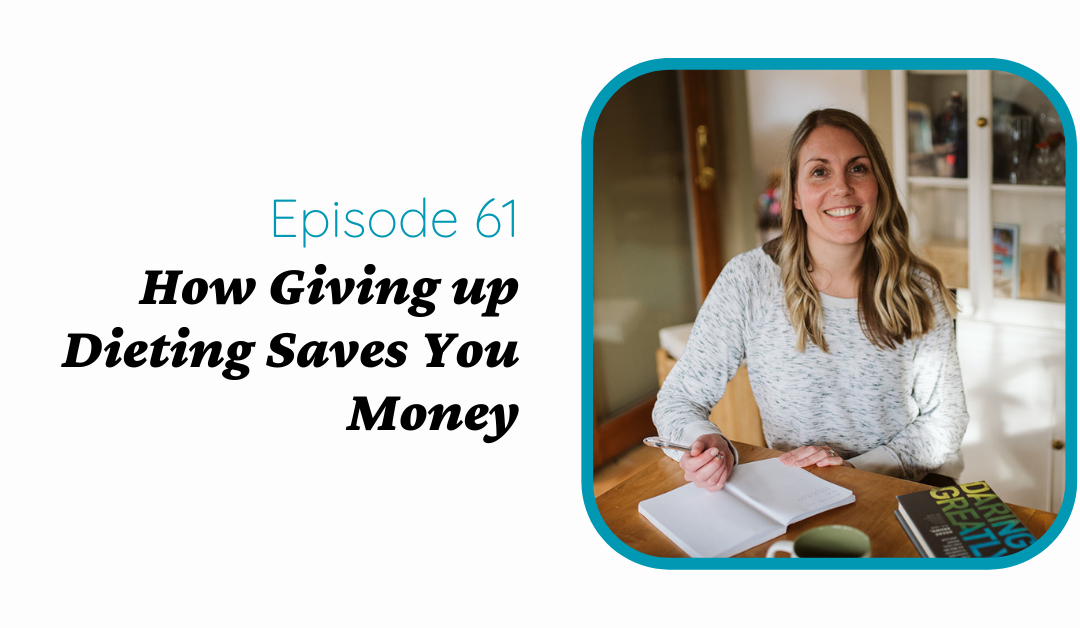Podcast: Play in new window | Download
Subscribe to The Innovative Therapist Podcast! Apple Podcasts | Spotify | RSS | More
Episode 61. One thing I often hear from folks is how expensive it is to make healthy lifestyle changes. And this can 100% be true. Today, I want to delve into some specifics, of the ways that giving up dieting can actually save you money, maybe lots of it. Are you intrigued? If you are a long time listener, you know I’m pretty minimalistic at heart. This does not mean I don’t have or like stuff, I truly do and frankly my house is a mess. However, I am always looking to simplify my life, de-clutter, and build more connections and experiences. That’s what minimalism means to mean, focusing on the value of things and experiences, and less on accumulation of things. We are going to get into some details and numbers here, so get ready and get excited!
We cover the following (and more!):
- My personal experience with spending money, time, and energy on diet culture.
- How minimalism can help fight consumer culture.
- How meal prepping can make cooking for your family a seamless process.
- Other ways to invest in your health.
- & so much more!
Are You New Here?
Welcome! I’m so glad to have you. You might be wondering what this blog and podcast are all about.
We relate everything in this podcast back to motivation, but not the hustle and grind kind. Truly sustainable motivation that keeps you feeling energetic and engaged in your life for the long haul. We talk about why “I’m just not motivated” is a myth, and why the TYPE of motivation you have is so important to fully understand. If you are ready to learn about motivation and respecting your body in an effective way so that you can live a life you truly love, you are in the right place.
Check out the Foundational Episodes of the Motivation Made Podcast here!
- Introduction: What is this podcast all about?
- Episode 1: Want to Get & Stay Motivated? A Crash Course on Motivation, Weight Loss, and Health
- Episode 2: How Dieting Steals Our Motivation
- Episode 3: How To Get Motivated To Improve Your Health (Motivation 101)
- Episode 4: How to Transform Health Fears Into Forward Progress
“I’m terrified I’m wasting my life.”
I wrote this in a journal in the middle of the diet-binge cycle. And frankly, I kind of was.
I’m here to tell you it’s never too late to gain control of your eating, respect your body, and live a life that’s TRULY consistent with your values. But you need to take the first step.
One of the very first steps in developing truly autonomous and body respecting motivation is to clarify what actually matters to you. Not your mom, not your sister, not your best friend, YOU.
The more you reflect on this, the more you can connect your values to your behaviors in a sustainable and empowering way.
Grab the free guide at DrHondorp.com/goals and get started today. I promise you, it’s never to late to stop dieting and start truly living. You will not regret it.
Healthy Eating and Money
Like many topics I talk about, sometimes I’m like, do I really wanna go here? But this is a topic I think is really important to consider. Particularly because money stress is VERY prevalent, before the pandemic, but for many it is especially now. I think people are also re-evaluating money and what it means for them.
When You Feel More Competent and Trust Yourself, You Can Make Smarter Money Decisions
When I was in the diet binge cycle I was desperate for a solution and to feel better. The amount of money I’ve paid to the diet industry for zero results (except more lack of trust in myself and guilt about “failing” another program) is a LOT.
I did Jenny Craig, which isn’t cheap.
I did Weight Watchers 3-4 times. At least that one was online so overall was cheaper.
I convinced my parents to buy a treadmill in high school which I barely used. Granted, that was their money and I think some family members occasionally used it? But not much, folks.
I was mostly a broke student (actually almost the whole time I was in the diet binge cycle I was a student) so I mostly did a lot of self-help approaches and therefore wasted money in the form of time, energy, and focus.
As a new business owner, a mom of 2 and a wife, I’m learning more than ever to value my time. It makes me cringe a little bit to think about all the wasted time, energy and focus I spent recording and counting calories and learning about what I thought was “healthy” (Read: chicken breast, steamed broccoli and other foods I didn’t like), when I could have been doing activities that would actually serve me long-term (hobbies, actually preparing meals that were nourishing and satisfying, learning to become a better cook, connecting with my friends, learning about intuitive eating!).
Spending Less on Your Health Isn’t Always the Answer
But don’t get me wrong, I’m not just saying “stop spending money, focus on health”. Spending less on your health isn’t always the answer. In fact, it often isn’t. It’s about spending smarter on things that will actually help you.
Diet culture and the weight loss industry makes money on repeat customers, and on us feeling bad about ourselves.
When we feel badly about ourselves, we buy their products to try to typically lose weight and “feel good, confident, get a partner, etc.”
We can get angry about it; that’s valid, and I certainly do. But ultimately it’s a business and it’s important to see it for what it is. We can let our anger be there, process the grief and lost time and opportunity, but then the question still remains, what do I want to do with my money instead?
It’s also often helpful to examine other things we do to try to feel happier, like overspending on clothes and things and where we might be able to re-allocate that money. Look, I’m all for treating ourselves with things we enjoy, and minimalism isn’t that. However, we need to look at if there’s opportunities to spend money in places that might be more effective, like getting us out of the ineffective diet cycle to free up more time, money, and resources to focus on other things that will actually move us forward.
With regards to collecting less stuff, I highly recommend the Netflix documentaries Minimalism and Less is Now. They help illustrate that our immense need for more stuff is often trying to fill an emotional need it cannot fill.
Let’s Spend Based on Principles of Efficiency (Work Smarter, Not Harder) and Think About How That Applies to our Health
In 2020, U.S. consumers spent an average of 8.6 percent of their disposable personal income on food—divided between food at home (5.0 percent) and food away from home (3.6 percent) (USDA website).
In 1960, total percent of income spent on food was 17%.
Examples of New Ways to Spend Money or Time that Will Actually Improve Your Health and Well-Being (and Thus Save You Money Over the Long-Term)
- Look for ways to reduce decision fatigue (and make the habit you want to do easier on your brain). One way to do this is to consider the aspects of meal planning and prep that tend to be taxing and outsource this. For many of us, myself included, this is the decision making process. Decision making is incredibly mentally taxing on our brains. The question of “What should we have for dinner?” feels like it shouldn’t be taxing, and yet, for most of us it VERY MUCH is. Think about all the decisions that surround eating a meal prepared at home: planning it, finding the recipe, writing a list, getting the ingredients, preparing the meal, cleaning it all up after. I’m exhausted just writing this list! The reality is, we live in a hustle culture, where more men and women are working outside the home, leaving less time for these activities. Options include using a meal planner to reduce the need to come up with ideas, grocery list, recipes. Or you can use a meal service. If you don’t like cooking, buy the pre prepared kinds or frozen meals (I’m a big fan of Amy’s meals for single servings)
- Invest in support. Good therapy, a support group, a coaching program like ours. Make sure you get on our waitlist to find out when doors open to our community based group coaching program.
- Implement more plant-based nutrition. Plant-based eating can be incredibly affordable. If this feels restrictive right now, maybe don’t do it. However, one option is to learn one plant-based recipe per week and try it out. I use the Forks Over Knives Meal Planner, but Dr. Yami one of my previous guests also has incredible tips for plant based eating from a non-diet framework you need to check out!
- Find an exercise or movement program that excites you. Joyn.co is actually free, but if like me you need some additional accountability to show up, try to find a class in person or online where you pay in advance for the class so you have more incentive to show up.
Support Independent Bookstores Near You!
Did you know that that if nothing slows their momentum, Amazon will have almost 80% of the book market by the end of 2025?
Look, I love the convenience of Amazon, but I got a super cool way that you can support local bookstores and my blog and podcast simply by buying books like you already do! You can choose any bookstore on the list in the US and Canada (they plan to expand to other counties in the future) OR you can just let the donation get split between all stories. As of this recording, they have raised 15 million dollars for local bookstores. On my bookshop, you will see my absolute favorite books related to health and wellness, courage and vulnerability, and even my favorite fiction and kids books!
My recent favorite related to improving the quality of our lives was Digital Minimalism. Our family actually has decided to do a optional screen free August to re-evaluate the role of screen time in our lives.
So if you believe in support local business, please consider buying your books through Bookshop from now on!
The Psychology of Wellness Bookshop Link.

Disclaimer: This blog and podcast is for informational and educational purposes only. It is not a substitute for individual professional advice or treatment, including medical or mental health advice. It does not constitute a provider patient relationship.
Disclosure: Using the Bookshop.org links in this post means that I would get an affiliate fee if you purchase from the online bookshop (this supports my business, and local bookstores too!).
